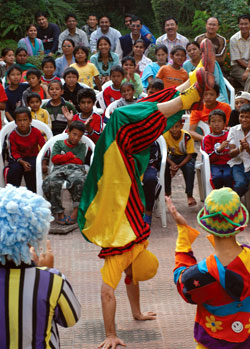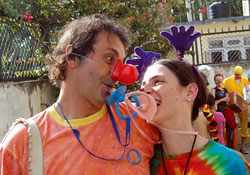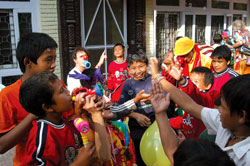|
|
A woman in a shirt patterned with smileys signals to a man wearing oversized pyjamas. Their mischievous eyes meet, and as their red noses squish against each other, they fill their cheeks with air. This draws great guffaws from the small crowd gathered on the street around them.
You've probably seen this group of funnily dressed people with red noses and a mish-mash of accents entertaining children and the elderly on the streets of Kathmandu this past week. They call themselves "smiling ambassadors," but many say they should instead be described as 'clown doctors'. They are currently in Nepal on one of the 'healing through humour' missions that take them around the world.
"We are all not professional clowns. We just want to bring joy and love where suffering is dominant," says an animated Ginevra Sanguigno. Sanguigno is founder of the group Clown One Italia. A theatre artist and teacher back home, she was encouraged to start the non-profit group after her meeting with Patch Adams in 1994. Adams is an American clown and doctor who founded a holistic medical centre and became famous after the eponymous 1998 movie based on his life starring Robin Williams.
"Patch taught us that you don't need special skills to make people happy, just the intention to spread love. And that is exactly what we are doing here-spreading the message of love and peace," says Sanguigno. Accompanying her are 11 clowns from Italy, Cambodia, and Japan who are here for two weeks and will be visiting orphanages, shelters, hospices, schools, and hospitals in Kathmandu and Pokhara run by organisations as diverse as CWIN, Sahara, Shanti Sewa Griha, Bal Mandir, Saathi, Dalit Welfare Organisation, Prayas Cooperative, and Maiti Nepal.
 |
| UPSIDE DOWN: Clowns amuse the children at CWIN shelter at Rabi Bhawan on Wednesday |
The group is also laying the groundwork to sponsor ten dalit girls to attend school for ten years. "This is our pilot project and we will start with the villages near and around Boudha because the school is located there," says Italo Bertolasi, organiser of the trip, who first came to Nepal 35 years ago and has since studied the work of jhakris. "I have studied the traditional way of healing, we now will mix it with the untraditional way (clowning)," he says.
"We may look stupid, but in this costume, you can be very powerful," Bertolasi adds. The group says that they use the power of ridicule to poke fun at figures of fear, such as men with guns. "In Afghanistan, a female clown tried to paint a red nose on a mujahideen who was carrying a gun. And what did he do? He ran away while the women and children all laughed," chuckles Bertolasi.
The members of Clown One Italia are clowns here, but back home they practise all kinds of professions-they are counsellors, artists, actors, and physiotherapists. They share a common goal, to hear sick children laugh, and see lonely old people smile. They are all volunteers, and some have used up their entire savings to come make Nepalis smile.
"We try to get funds for all our trips, but sometimes we don't have enough for everyone in the group," explains Sanguigno. Even when they do, there's just enough to cover airfares. In Nepal, their accommodation and logistics is sponsored by Apeiron, an Italian organisation that works to uplift poor and disadvantaged women and children.
"Nepalis are cheerful people despite their suffering. But the war has left many people displaced and bitter. We are here to remind them that they should not forget to smile because only that can give them the courage to go on," says Sanguigno.
Clown for love
 Vania Calzavara, 30, was studying to become a diplomat but she gave that up to do something decidedly undiplomatic-be a clown and promote clowning around. Calzavara decided to work with her boyfriend, Fabio Sorgato, 40, who runs voluntary clownery workshops in Thiene, Italy.
Vania Calzavara, 30, was studying to become a diplomat but she gave that up to do something decidedly undiplomatic-be a clown and promote clowning around. Calzavara decided to work with her boyfriend, Fabio Sorgato, 40, who runs voluntary clownery workshops in Thiene, Italy.
"For me, being with the person you love is far more important than a great career," she says. Seeing the joy Fabio spread among people, she also became a clown. "Four times a week, we visit hospitals, orphanages, nursing homes and prisons and make people laugh," adds Calzavara.
But life for the couple is not always funny. Calzavara works ten hours a day managing a local bakery in Thiene. She earns just about enough for the both of them. "I saved 3500 euros so Fabio and I could come to Nepal. We are also celebrating his birthday here," smiles Calzavara.
Does the almost-diplomat plan on being a clown all her life? "Yes," she shoots right back. "Money is not everything. Once you know how not to waste money, a little is enough."



